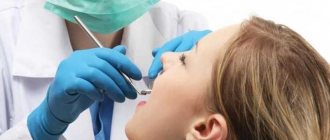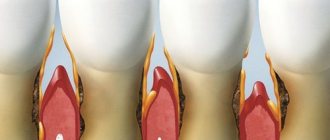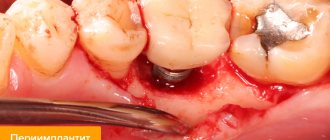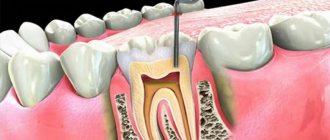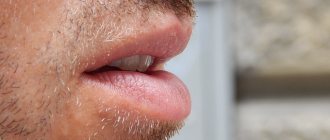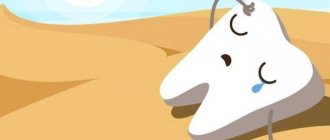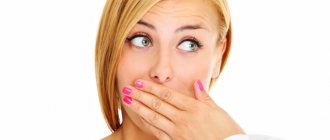Rest for a person is a physiological necessity, without which the organs of the system do not function normally. When a person grinds his teeth in his sleep, full restoration of strength does not occur. In addition, this condition indicates problems with health in general.
If bruxism is not eliminated, the consequences for the body will be more severe than just chronic lack of sleep.
What is bruxism
Clenching your teeth while sleeping is called bruxism. The attack, during which the jaws clench tightly, friction occurs and grinding sounds, lasts from a few seconds to 10 minutes and is repeated periodically throughout the night. Usually the phenomenon is accompanied by changes in blood pressure, breathing problems, and increased heart rate.
Bruxism is observed in 50% of children; as they grow older, in most cases, teeth grinding at night stops. But it’s better to find out the reasons right away in order to avoid health problems in the future. In adults, the phenomenon is less common and is not considered an independent disease, but this is a clear signal that not everything is in order with the body.
There are two types of bruxism:
- Day. It does not occur as often, it is easier to recognize. Periodically during the day, during tense moments, a spasm of the jaw occurs, which takes on an unusual, abnormal position. In most cases, self-control will help you cope with daytime bruxism.
- Night. It is much more dangerous, because during deep sleep a person does not control his actions.
At the time of an attack, pressure is applied to the jaw that is 10 times greater than the load during chewing.
Is it possible to prevent teeth grinding at night?
It is difficult to talk about preventing a disease whose exact cause has not been established. Therefore, the prevention of bruxism includes generally accepted health measures:
- elimination of stressful situations;
- rejection of bad habits;
- dosed physical activity;
- balanced diet;
- creating comfortable conditions in the bedroom.
Advice! Sometimes it is enough for a person not to drink strong coffee or smoke to get rid of night grinding. The main condition for successful prevention is maintaining a healthy lifestyle.
Reason #1: Stress
Scientists from the University of Dusseldorf conducted a study involving 48 subjects and proved that the main cause of bruxism is stress. In sleep, the body rests, cleanses itself and gets rid of unnecessary information, and clenching the jaw, a person continues to experience the troubles of the day at night. Constant nervous tension is a sure way to the development of this disorder.
INTERESTING FACTS!
- Representatives of the following professions are most susceptible to stress: surgeon, photojournalist, passenger plane pilot, realtor, manager.
- Dark chocolate, laughter and... good deeds help reduce stress hormones. The famous scientist Allan Lukes claims that after sincere, selfless help to strangers, a person experiences happiness and satisfaction. The body produces endorphins, it relaxes and gets rid of stress. This is also confirmed by a 30-year study that showed that women who cared about other people, and not just their family, were 2 times less likely to get sick and enjoyed life more.
USEFUL INFORMATION: Why you always want to sleep: reasons and how to treat it
Dental problems
Bruxism can be a consequence of pathology in the development or structure of the teeth, jaw or other structures of the oral cavity.
Among the most common reasons are the following:
- malocclusion;
- dental anomaly;
- incorrect selection of braces or dentures;
- poor quality dental treatment;
- pathology of the joints that connect the lower jaw to the temporal bone.
Symptoms
Teeth grinding at night is the first and surest sign of bruxism.
But it is almost impossible to find out about it without outside help. To independently identify the disease, you should pay attention to the condition of the enamel, to the presence of an increased reaction to sweets, hot or cold. New holes, chips, or dentures may have become damaged for no apparent reason. All this is indirect evidence of the development of a movement disorder. There are a number of additional signs that may indicate the manifestation of night bruxism:
- throbbing pain in temples in the morning;
- dizziness and ringing in the ears;
- soreness of the jaw muscles;
- constant feeling of fatigue, drowsiness;
- discomfort in the sinuses;
- restless sleep and frequent awakenings.
USEFUL INFORMATION: Why does a person sweat a lot during sleep at night: reasons
Causes of teeth grinding during sleep in adults
The polyetiological components of the disease already indicate the complexity of the problem. Modern research has made it possible to establish a closer connection between the occurrence of bruxism and disorders of the nervous system.
Teeth grinding at night is caused by daily stress and anxiety.
In society, these problems have become everyday issues. Nervous tension provokes the release of adrenaline. Depression does not allow muscle tissue to relax, causing them to periodically spasm sharply. At night this happens involuntarily.
The cause of teeth grinding at night in adults is an incorrect bite. The problem may be congenital or acquired at an early age. The quality of sleep is affected by colds or other chronic diseases of the body, which worsen at night. Such conditions lead to sleep apnea, which is a disorder in the breathing rate during sleep.
Nervous disorders, anxiety and stress
The most important function of sleep is to cleanse the nervous system of negative information. At night, in a dream, a person also tends to analyze the problems of the past day on an unconscious level. Due to the accumulated negative information, it is impossible to rest and relax normally. This is why they grind their teeth in their sleep due to nervous overstrain.
At night, a person grinds his teeth during REM sleep. Mobility of the eyeballs and involuntary muscle twitching are observed. Stress causes severe snoring, talking in your sleep, and even walking at night. In severe cases, when mental trauma or nervous disorder is serious, enuresis may develop with bruxism. Treatment in this case is complex, with the elimination of the main causes of the development of pathology.
Dental causes of bruxism
The causes of bruxism are rarely related to problems in the dental arch. Moreover, not all occlusal disorders cause teeth grinding during sleep at night. The doctor will be able to determine that dental changes are the cause of bruxism directly at the appointment.
Anomalies of jaw development
Predisposing factors for grinding are:
- incorrectly placed fillings;
- supernumerary teeth;
- abnormalities in the development of the jaw arch;
- periodontal inflammation;
- poorly installed removable and fixed dentures;
- anomalies in the location of teeth;
- multiple caries.
Inflammatory diseases of the oral cavity irritate the mucous membrane, causing itching and burning. As a result, a person, while sleeping, reflexively begins to clench his jaw, which is expressed in the manifestation of a creaking sound.
Inflammation of the temporomandibular joint
One of the reasons why a person grinds his teeth in his sleep is various diseases of the lower jaw joint. This occurs with an inflammatory lesion in the form of arthritis.
The disease is characterized by:
- clicking sounds when opening the mouth or chewing;
- pain when closing the jaws;
- difficulty chewing food;
- spontaneous periodic pain;
- hearing loss;
- swelling in the joint area;
- restriction in mouth opening.
The inflammatory process in the temporomandibular joint increases the nerve impulses of the masticatory muscles. When soft tissue contracts, the lower jaw actively moves. The result is teeth grinding at night.
Side effects of medications
Incorrect selection and treatment of medications leads not only to the lack of the desired effect, but also to side effects. Some drugs, even if you follow all the doctor’s recommendations, can cause unpleasant effects due to the nature of their effect on the body.
If a person grinds his teeth a lot at night while sleeping while taking medications, then reduce the daily dose of the drug or replace treatment with similar medications. The problem occurs when taking sleeping pills, psychotropic drugs and antidepressants.
Grinding of teeth during sleep due to certain diseases
There are many reasons why adults grind their teeth during sleep. Even some common diseases can cause such a pathology. For example, Huntington's chorea is often accompanied by bruxism.
Gastroesophageal reflux causes serious problems with digestion and even the respiratory system. The release of food from the stomach greatly irritates the mucous membrane of the esophagus and even the oral cavity, day and night. Due to unpleasant sensations, a person constantly swallows in his sleep, thereby reflexively clenching his jaw, which causes his teeth to grind heavily.
Bruxism problems also appear in Parkinson's disease. The pathology is associated with damage to the nervous system, which makes involuntary muscle contraction throughout the body inevitable. In this case, the underlying disease is treated.
Other causes of bruxism
One of the reasons why teeth grind at night may be sleep apnea. This phenomenon is characterized by holding your breath for up to 10 seconds or more while resting at night. If the absence of breathing lasts more than 1 minute, then severe disorders in the body may develop:
- formation of diabetes;
- liver diseases;
- pathological changes in the functioning of the nervous system;
- weight gain, especially in women;
- diseases of the cardiovascular system;
- mental fatigue and emotional burnout;
- pathological edema;
Bad habits in the form of excessive alcohol consumption and tobacco smoking (typical for men) also lead to the development of creaking enamel.
When you have worms, you grind your teeth: myth or truth
Night bruxism is often associated with the presence of parasites in the body. Numerous studies practically refute this theory. There is no direct connection with these parasites and the presence of teeth grinding during sleep. But still, indirect connections allow such a phenomenon. The theory why people with worms grind their teeth both at night and during the day:
- Vitamin B12 deficiency. The synthesis of useful substances is reduced precisely because of the presence of these parasites in the body.
- Violation of neuromuscular transmission. The pathological condition negatively affects the entire musculoskeletal system, including the functioning of the masticatory muscles. As a result, a person begins to grind his teeth.
- Reducing the amount of oxygen. Against the background of infection of the body, hypoxia of the brain is observed. This condition affects the depth of sleep and the occurrence of involuntary muscle contractions.
- Neurotization. The presence of helminths affects the mental status of a person. Increased irritability, fatigue and even aggressiveness appear. Sleep becomes restless and superficial, with constant awakening and sudden muscle contractions.
Treatment of bruxism
First, you need to identify the nature of bruxism, determine whether the problem relates to the dental field or has psychological causes. Based on the results, it is necessary to contact the right specialist as soon as possible to avoid serious consequences. Your doctor will tell you what to do first and how to get rid of the problem. The most common measures used in treatment:
- A complete dental examination and elimination of all problems in the oral cavity, including correction of malocclusion.
- The use of special mouthguards made individually according to the size of the patient’s jaw. With their help, teeth are protected from injury, but they cannot completely get rid of the problem.
- Injections of a minimal amount of Botox. It prevents the jaws from clenching tightly, partially paralyzing the muscles of the mouth.
- Apply soothing warm compresses before bed.
- Taking medications and vitamin-mineral complexes, including magnesium, calcium, B vitamins.
- Minimizing stressful situations, allocating time during the day for rest and walks.
- Limit heavy food intake in the evening. This will promote muscle relaxation and healthy sleep.
If a serious pathology of the jaw is detected, surgical intervention, such as plastic surgery of the articular disc, or the use of laser therapy is possible.
Dr. Komarovsky about bruxism in children
The famous pediatrician Komarovsky points out that daytime bruxism in children is not a reason to panic. Sometimes a child grinds his teeth, pursuing only one goal - to study his mouth and evaluate its capabilities.
However, the doctor identifies some other causes of night bruxism:
- Overgrowth of adenoids.
- Teething.
- Genetic predisposition.
- Deficiency of B vitamins in the body.
The doctor recommends normalizing the child’s nervous system. To do this, you can take him for a massage. Before bed, healthy warm herbal teas and a bath. In winter and spring, it is necessary to offer your child vitamins.
Bruxism is often a consequence of attention deficit. If this is the reason, then any parent can eliminate it.
Special exercises and massage
Exercises and self-massage will help in the treatment of bruxism:
- Squeezing your jaw with your palms below on both sides, you need to press lightly with your fingers, massaging it in a circular motion. It is advisable to repeat such manipulations, which help relieve tension from the problem area, every day for at least 2-3 minutes.
- Chin muscle training. With your mouth slightly open, you need to push your jaw back with your fingers. The procedure is repeated several times during the day, at least 10 times in 1 approach.
- Chewing gum exercise. You need to roll the chewing gum balls from one corner of your mouth to the other. It is better to do this before going to bed, until you feel tired in your muscles, then the likelihood that your jaw will be clenched tightly in your sleep will sharply decrease.
USEFUL INFORMATION: Lower back pain after sleep: reasons why lower back hurts in the morning
Daytime and nighttime bruxism
In various medical literature there are diametrically opposed opinions about the extent of the spread of bruxism in the world. Some publications claim that up to 40 percent of the entire population of the planet suffers from involuntary contraction of the chewing muscles. More often than not, these numbers are far-fetched and do not reflect the real overall clinical picture.
Modern domestic medical statistics show that, on average, about 3 percent of the population of the Russian Federation suffers from bruxism, while 3 out of 4 patients experience attacks at night and only a quarter during the day.
The patient himself cannot track nocturnal bruxism
During the day, bruxism is also expressed in involuntary grinding of teeth, but it does not manifest itself in the resting stage, but under strong psycho-emotional stress. The patient cannot stop this pathology by force of will, but at the same time he fixes the problem visually and tactilely, which allows him to seek medical help from a specialized specialist as quickly as possible.
Possible complications
If measures are not taken in time, bruxism can cause a number of serious consequences:
- Wearing, loosening and loss of teeth.
- Development of caries.
- Inflammation of periodontal tissues.
- Malocclusion.
- Pathologies of the temporomandibular joints.
- Chronic headaches.
- Depression and nervousness.
- Spasms and pain in the facial muscles.
The psychological consequences of bruxism are disastrous. Grinding of teeth gives rise to many complexes. The person becomes withdrawn, irritable, avoids new acquaintances, ashamed of his problem.
At the slightest suspicion of bruxism, you should immediately consult a doctor. The sooner you can identify the problem and begin treatment, the sooner you can return to a full life.
Do I need to go to other doctors and why?
If the dentist determines that you have a problem such as bruxism, then you will simply need to go to specialized specialists. If this is not done, the results of the dentist’s work will be in vain.
Most often, the patient is referred to a psychologist or neurologist. These doctors may prescribe drug therapy: muscle relaxants, anticonvulsants and sedatives. Specialists can also prescribe Botox injections, a course of manual therapy, acupuncture and massage. They will teach you how to relax your jaw muscles with the help of special exercises and help you cope with fears and irritation.
Lifestyle
Lifestyle makes a huge difference regarding nighttime teeth grinding.
It can be provoked by the following factors:
- taking energy drinks before bed or in large doses throughout the day;
- dynamic activities before bed (sports, dancing);
- drinking alcohol in large doses during the day or before bedtime;
- smoking;
- drug use;
- irregular working hours;
- stress at work.
Homeopathy
Among homeopathic medicines for teeth grinding, those that have a sedative effect are used:
- Tenoten - a unique homeopathic drug with a sedative and antidepressant effect, which should be taken orally, without chewing or swallowing, wait until it is completely dissolved in the mouth, 1 tablet. 2 times a day. Do not use with food. Duration of treatment is 1-3 months.
- Notta – consume 10 drops. 3 times a day half an hour before meals. The course of treatment is 1 month, if necessary, can be repeated after a 2-week break.

